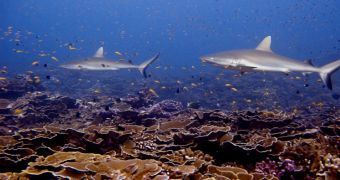Throughout the world, conservation biologists are indicating ecosystems that are beginning to degrade on account of the fact that large predators are being removed from the food chain. Without them, the intricate webs that keep habitats tightly-knit are broken, and the ecosystem suffer.
Large predators and other “apex consumers” are the ultimate link in the food chain, and they main responsibility as such is to keep all other animals under control. The way in which creatures in the food web prey on each other determines the health of the system.
At this point, a wide range of terrestrial, freshwater and marine ecosystems are no longer being shaped or influenced by large predators. A new study concludes that the loss of these animals is the primary influence that the spread of our species is having on the natural world.
This investigation was conducted by an international collaboration of researchers. Details of the work appear in this week's issue of the top journal Science. University of California in Santa Cruz (UCSC) marine ecologist and evolutionary biologist James Estes was the lead author of the research.
He explains that large predators and apex consumers were once spread throughout the globe, inside every ecosystem and food chain. In fact, these creatures were responsible for modeling the very structure and dynamics patterns inside these systems.
But excessive hunting and habitat fragmentation have brought these creatures to their knees, with many species going extinct as a result. Their disappearance usually leads to deteriorating water quality, disrupted nutrient cycles, changes in vegetation patterns, and an increased number of invasive species.
Apex consumers indicate animals such as the elephant and bison, which are not necessarily top predators. When it comes to predators, animals such as sharks, wolves, predatory birds and large fish are in decline around the world.
Removing these animals from the food chains results in a phenomenon called “trophic cascade,” which is when the effects of their absence reverberate further down the food chain. In this manner, these consequences can span the entire system.
David Garrison, the director of the NSF Biological Oceanography Program, says that the work “highlights the unanticipated effects of trophic cascades on Earth systems, including far-reaching processes such as biogeochemical cycles.”
The US National Science Foundation (NSF) partially funded the new research effort. “The removal of predators like sharks and sea otters, bass and wolves has consequences, not only for these species, but for all of us,” the official says.
“The top-down effects of apex consumers in an ecosystem are fundamentally important, but it is a complicated phenomenon. They have diverse and powerful effects on the ways ecosystems work, and the loss of these large animals has widespread implications,” Estes concludes.

 14 DAY TRIAL //
14 DAY TRIAL //